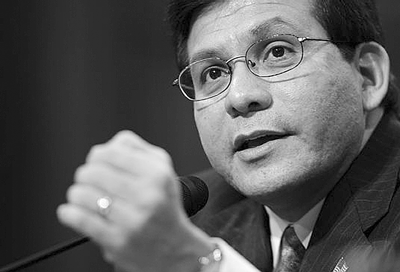Case of gay man beaten by police sent to Gonzales for final adjudication
A federal appeals court in San Francisco ruled on April 25 that the Board of Immigration Appeals erred in rejecting an asylum petition by Aurelio Pena-Torres, a gay man from Mexico, and remanded the case to Attorney Gen. Alberto Gonzales “to exercise his discretion in determining whether to grant Pena-Torres asylum.”
The court’s description of the rulings by the immigration judge as affirmed by the board show the severe bias against gay asylum applicants characteristic of the federal government’s immigration policies.
The court’s opinion, not attributed to any single member of the court, does not indicate how Pena-Torres came to be in the United States, but recounts the incident that undoubtedly prompted him to leave Mexico. According to testimony in his asylum hearing, after leaving a gay bar and truthfully answering questions from individuals wearing police uniforms about his sexuality, the men beat Pena-Torres into unconsciousness. Pena-Torres required hospitalization and the police threatened to retaliate if he reported their actions to higher authorities.
Reports from the U.S. Department of State indicate that “violence against gays is not uncommon” in Mexico, “especially in establishments or areas frequented by gays.”
Astonishingly, in spite of crediting Pena-Torres’ account of this incident, the immigration judge opined that it “seemed to be more a case of police brutality rather than persecution of a homosexual.” Despite the state department reports and Pena-Torres’ testimony that anti-gay harassment in Mexico is pervasive, the judge, in rejecting the asylum request, asserted that gay Mexican men were not a “distinct social group,” and Pena-Torres could return to Mexico without fear of persecution for being gay because Mexico is a “vast country.”
The Ninth Circuit Court panel in San Francisco disagreed, pointing out that the court follows the “consistent practice of finding persecution where the petitioner was physically harmed,” and that “under our precedents, the 1994 incident compels the conclusion that Pena-Torres suffered past persecution.” Consequently, he is entitled to stipulate a presumption of a well-founded fear of future persecution. Such presumption can be rebutted by U.S. immigration officials by the feasible location of an asylum applicant to another part of his home country, or by showing through state department reports that government sanctioned anti-gay oppression is not generally a problem.
The immigration judge had found that the presumption was rebutted because Pena-Torres testified that he had revisited Mexico without incident a few times since coming to the U.S., that relocation in such a “vast country” as Mexico is feasible and that state department reports show that “there is no systematic official persecution of homosexuals” in Mexico.
The federal appellate court did not support the government’s assertion that Pena-Torres could relocate, noting that anti-gay violence in Mexico is not isolated to one area.
Pena-Torres’s biggest problem on appeal was the testimony about his return trips, which the government argued demonstrated a more tolerant change in circumstances from the time he was beaten.
“While the existence of return trips has been one of several factors in other cases of this circuit,” wrote the court, “this circuit has never held that the existence of return trips alone rebuts an applicant’s presumption.” Since the government had abandoned reliance on the state department’s Mexico report, which if anything supported Pena-Torres’ case, and the court found conclusions about the opportunity for relocating elsewhere unsupported by the record, there was nothing apart from the return trips to be held against Pena-Torres on this review. Consequently, the court held that the presumption in favor of his claim was not rebutted.
However, under existing immigration law, the court could not order that asylum be granted to Pena-Torres, only that the attorney general, the named defendant in this case, can consider his application and exercise discretion. If Gonzales denies the petition, Pena-Torres would be left to argue abuse of discretion, a very difficult standard to meet.
Nonetheless, due to its rarity, a reversal of the Board of Immigration Appeals is a notable accomplishment. Pena-Torres failed to persuade the court on another part of his case, in which he sought a status called “withholding of deportation,” under which somebody not qualified for asylum can nonetheless remain in the U.S. by showing a high probability of imminent harm were he to return to his home country. The standard of proof is higher than that for asylum, and as to this, Pena-Torres’s testimony about his return visits to Mexico were found to be “sufficient evidence” to rebut any presumption of a well-founded fear of imminent harm.
Arthur S. Leonard, a professor at New York Law School, has been actively involved in lobbying in favor of banning military recruiters at his campus, a FAIR member, and others.
gaycitynews.com


































